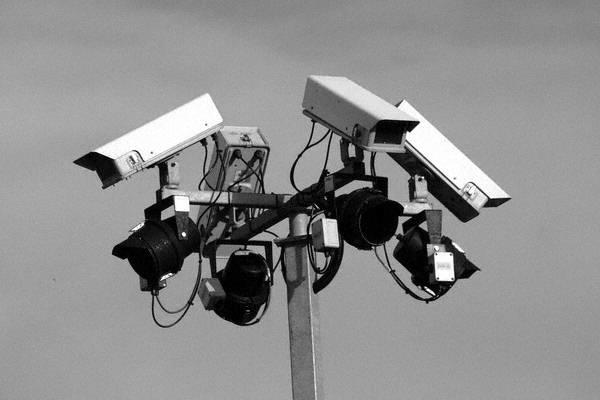
Closed-circuit television (CCTV) is the use of video cameras to transmit a signal to a specific, limited set of monitors. It differs from broadcast television in that the signal is not openly transmitted, though it may employ point to point wireless links. CCTV is often used for surveillance in areas which need security, such as banks, casinos, and airports or military installations. Increasing use of CCTV in public places has caused debate over public security versus privacy. In industrial plants, CCTV equipment may be used to observe parts of a process that are remote from a control room, or where the environment is not comfortable for humans. CCTV systems may operate continuously or only as required to monitor a particular event.
The first CCTV system was installed at Test Stand VII in Peenemünde in 1942, for observing the launch of V2-rockets. CCTV recording systems are often used at launch sites to record the flight of the rockets, in order to find the possible causes of malfunctions. Film cameras are also used for this purpose. Larger rockets are often fitted with CCTV allowing pictures of stage separation to be transmitted back to earth by radio link. CCTV is also used to observe the launch pad before the launch, especially when no person may be there, because of safety reasons.
Many cities and motorway networks have extensive traffic-monitoring systems, using closed-circuit television to detect congestion and notice accidents. The London congestion charge is enforced by cameras positioned at the boundaries of and inside the congestion charge zone, which automatically read the registration plates of cars. If the driver does not pay the charge then a fine will be imposed. Similar systems are being developed as a means of locating cars reported stolen.
Opponents of CCTV point out the loss of privacy of the people under surveillance, and the negative impact of surveillance on civil liberties. Furthermore, they argue that CCTV displaces crime, rather than reducing it. Critics often dub CCTV as "Big Brother surveillance", a reference to George Orwell's novel Nineteen Eighty-Four, which featured a two-way telescreen in every home through which The Party would monitor the populace.
CCTV has also recently been used to aid media attention in the celebrity world with such shows like Big Brother where for around three months, a number of contestants (normally fewer than fifteen at any one time) try to win a cash prize by avoiding periodic publicly-voted evictions from a communal house. The show, a kind of 'real life soap'. YouTube a popular free video sharing website which lets users upload, view, and share video clips has also taken advantage of this technology.
No comments:
Post a Comment